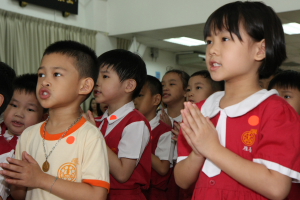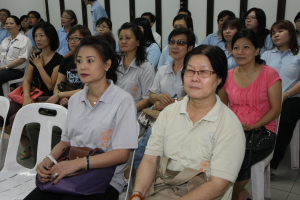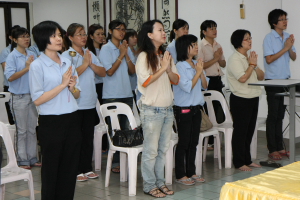Than Hsiang Kindergarten held a simple ceremony for imparting the Ten Good Deeds to parents, teachers, children of Before and After School Care and 6-year-old children of Than Hsiang Kindergarten at 9am on 27 March 2012.
The ceremony was held in two stages. First, Venerable Zhen Ti imparted the Ten Good Deeds to teachers, parents and Ai Xin Ma Ma. Then, witnessed by Venerable Zhen Ti, Fu Yek Ming, headmistress of Than Hsiang Kindergarten imparted the Ten Good Deeds to the children.
Before the ceremony began Venerable Zhen Ti gave a brief account of the evolvement of the Ten Good Deeds. This set of moral principles was brought into Malaysia by a Taiwanese monk, Venerable Hui Tian. The original Buddhist version of the Ten Good Deeds has been adapted to suit the multi racial/religious environment in Malaysia so that it will be acceptable to all.
The current version for students is as below:
1.Be filial piety to parents
2. Honour teachers and elders
3. Have faith in a religion
4. Study diligently
5. Be friends with the virtuous
6. Love and respect life
7. Be grateful and contented
8. Speak politely and lovingly
9. Love others as you love yourself
10. Spend time wisely
In fact, the Ten Good Deeds is in accord with the core of Buddhism where Buddhism emphasizes doing good deeds while keeping away from evils. Since the home has a great impact on the personality growth of students, it is advisable that not only teachers but also parents should try to practise the Ten Good Deeds in their daily lives so that they may become role models for students. Venerable Zhen Ti also elaborated on the respective roles of students, teachers and parents in practising the “Ten Good Deeds”.
The “Ten Good Deeds”for teachers and parents are as below:
|
The Ten Good Deeds for Teachers
|
|
|
The Ten Good Deeds for Parents
|
|
|
|
|
|
|
|
|
3.Purify mind and speech through mental and physical practice.
|
|
|
Avoid negative habits/ purify speech, actions and thoughts
|
|
|
|
|
To make oneself useful/ avoid idling
|
|
|
5.Portray a good role model
|
|
|
To share good and bad times.
|
|
|
|
|
|
7.To contribute sacrifice voluntary and generously-knowledge, work and time.
|
|
|
|
8.To speak and listen kindly.
|
|
|
Use kind and gentle speech
|
|
|
|
|
|
10.Be diligent or industrious
|
|
To create a warm and harmonious gathering/ environment |
Towards the end of the ceremony, led by the headmistress, teachers and students pledged that they would practise the Ten Good Deeds in their daily lives. Finally Venerable Zhen Ti conducted the transference of merits to all sentient beings. It was indeed a simple ceremony with profound significance.






